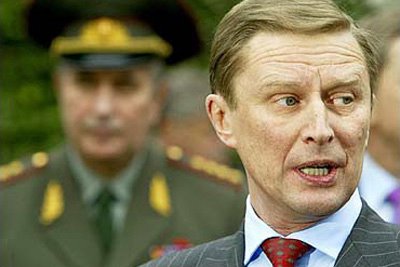
DID GLONASS FAILURE SINK IVANOV’S CHANCE AT THE PRESIDENCY?
Publication: Eurasia Daily Monitor Volume: 5 Issue: 23
By:

The Russian Global Navigation Satellite System (GLONASS) has long been a priority in the development of Russian space technologies. Last March, in a major speech on the future of space development, Russian President Vladimir Putin singled out global positioning as a field in which Russia has great potential, but Russians were still using the U.S. Global Positioning Satellite (GPS) instead of GLONASS. Putin then announced that First Deputy Prime Minister Sergei Ivanov had been given special orders to make sure that GLONASS would be in proper working order. “I expect, Sergei Borisovich, that by the end of 2007 this task will be fulfilled,” said Putin (www.kremlin.ru, March 29, 2007). Now Ivanov has announced that GLONASS is defective and Putin’s orders have not been carried out (RIA-Novosti, January 23).
On Christmas Day 2007, the Russian military successfully launched a Proton-M rocket with three GLONASS satellites from Kazakhstan. Reports about the launch proclaimed that Russia now had a system on par with GPS. Later, during a televised Cabinet meeting, Putin asked Ivanov when his pet Labrador, Koni, would get a working GLONASS positioner “so that she will not run away.” Ivanov confidently reported that would be operational by mid-2008 GLONASS and Koni would have her positioner (RIA-Novosti, Rossia TV, December 26).
At the time, independent observers expressed concern that official optimism about GLONASS was unfounded, that of the 18 GLONASS satellites currently in orbit only 13 were in fact operational, that the positioning system will be dysfunctional for at least two more years, and that at best GLONASS provided positional accuracy of only 10–17 meters (Nezavisimaya gazeta, December 26, 2007). In less than a month Ivanov has come around to agree with the critics, announcing that the positioning system is inaccurate and does not cover all of Russia all of the time, that the GLONASS satellites are unreliable, that Russian industry is not producing GLONASS positioners, and the leadership of the Federal Space Agency (Roskosmos) “should be held personally responsible for the shortcomings in the work of the global navigation system.”
The Soviet military launched the first GLONASS satellites in the 1980s to counter the Pentagon’s GPS. In September 1993, GLONASS was officially declared operational with 12 satellites. In December 1995 with 24 satellites, GLONASS became fully operational for a short time, but as the satellites soon malfunctioned, the entire system swiftly decayed (www.strana.ru, December 26, 2007). To get a reading a global positioner needs to get the signal of at least three satellites. The United States has at present 30 GPS satellites in orbit that provide global positioning anytime, Russia has only 13 functional GLONASS satellites and those do not provide stable positioning anywhere. Sometimes during a day there are three satellites over the horizon, there is a reading, sometimes there are fewer, and sometimes there are none.
Russian leaders are traditionally highly suspicious that their subordinates are regularly deceiving the supreme leader by reporting nonexistent successes. With GLONASS the deceit did not work. Putin most likely has a GLONASS positioner and personally figured out that unlike GPS, GLONASS is inaccurate and unstable. Putin apparently gave Ivanov a dressing down, and Ivanov, in typical Russian bureaucratic style, passed the buck to Roskosmos, threatening dismissals. The commander of the Russian Space Troops, General Vladimir Popovkin, added to Ivanov’s criticism of Roskosmos, declaring their product unreliable and outdated.
Popovkin called for a reform of the space industry and the creation of a special space state corporation (Interfax, December 25, 2007). State corporations have recently become a popular tool to build state capitalism and spend billions of Russia’s petrodollar wealth.
The Russian space industry is reasonably competitive, unlike many other sectors of the Soviet technological and industrial heritage. Roskosmos is earning billions of dollars from contracts with NASA to service the International Space Station and by making and launching foreign and Russian satellites (Itar-Tass, April 12, 2007). Roskosmos has been successfully integrating its products with Western-made hardware. Last week a Proton-M rocket successfully launched a Russian Express-AM33 communications satellite from Kazakhstan. The satellite will provide commercial and government communication services. The satellite’s platform was made in the closed nuclear city of Krasnoyarsk-26 (Zheleznogorsk) at the same industrial unit that makes the GLONASS satellites, while the electronic hardware of Express-AM33 was provided by the French company Thales Alenia Space (RIA-Novosti, January 28).
Popovkin explained that Russia widely uses foreign components to make satellites but cannot buy U.S. space-quality electronics, because they may be sabotaged by secret “insertions.” So Moscow is forced to buy cheap replacements not designed for satellite use from other sources. Thus the Russian military gets satellites that are sabotage-free – but they do not work well.
The Russian military and the Kremlin want an operational GLONASS to begin to develop and deploy an array of nuclear and conventional precision-guided weapons, since the Pentagon-controlled GPS cannot be used in targeting as long as the United States is considered to be Russia’s main potential adversary.
Ivanov’s failure to make GLONASS work may have contributed to Putin’s decision to pick his other first deputy prime minister, Dmitry Medvedev, as the next president. In Stalin’s times, such failures would have led to executions. Putin’s sinister joke about the need to GLONASS-position his dog smacks of Stalin’s bloodthirsty sense of humor.




